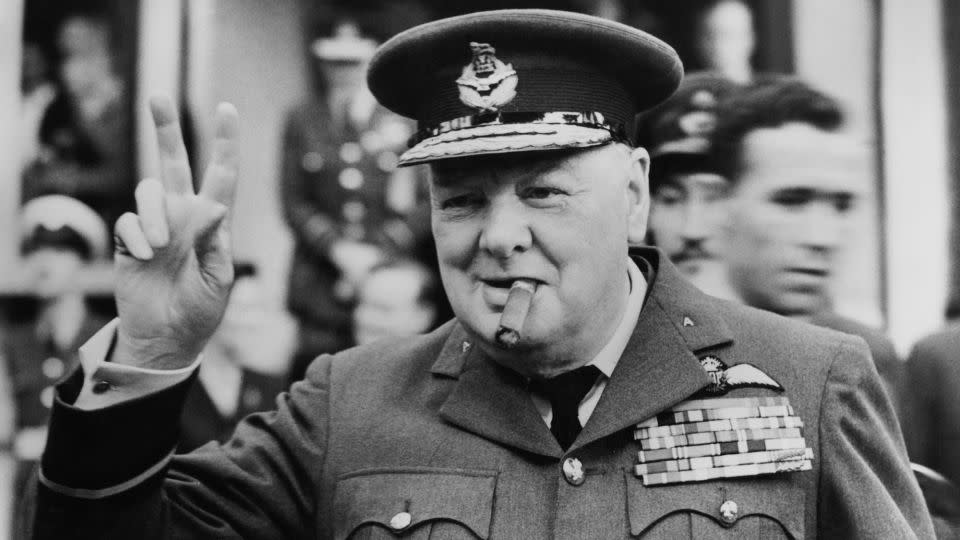Opinion: The UK just moved a step closer to banning smoking. Here’s the sticking point
- Oops!Something went wrong.Please try again later.
- Oops!Something went wrong.Please try again later.
Editor’s Note: Holly Thomas is a writer and editor based in London. She is morning editor at Katie Couric Media. She tweets @HolstaT. The opinions expressed in this commentary are solely those of the author. View more opinion on CNN.
Last week, former UK Prime Minister Boris Johnson treated a Canadian crowd to a helping of his signature bombast.
“The party of Winston Churchill wants to ban [cigars]?” he moaned. “Donnez-moi un break, as they say in Quebec. It’s just mad.”
The source of his ire was the proposed UK smoking ban, which was spearheaded by Prime Minister Rishi Sunak at last October’s Conservative Party Conference and underwent its second reading in the House of Commons on Tuesday evening.
In a free vote, the House leaned in favor of the plan by 383 to 67, meaning the bill cleared its first parliamentary hurdle.
Under the proposed bill, no one born on or after January 1, 2009, would ever be allowed to buy tobacco, effectively raising the legal smoking age every year. This would mean today’s 15-year-olds will never legally be able to buy cigarettes.

Despite what Johnson may have led his audience to believe, a potential smoking ban enjoys broad popular support in the UK. A February survey by YouGov for the charity Action on Smoking and Health found that 71% of adults backed the goal of making Britain a country where no one smokes (12% are opposed). Like most people, I’m certain this would save many lives and relieve a massive strain on the National Health Service (NHS). Whether that goodwill proves sufficient to overcome the many obstacles still ahead remains to be seen.
Johnson may have invoked one of the most tired clichés in British politics (his obsession with Churchill’s legacy is matched only by his obsession with his own), but in this instance, it’s at least adjacent to something relevant. Conservative backbenchers led by former Prime Minister Liz Truss have condemned the proposed bill as “profoundly unconservative,” adding that it “only gives succor to those who wish to curtail freedom.”
This, whatever people’s politics, is a sticking point. Smoking isn’t just the teenage rite of passage glamorized by shows like “Skins” and “Euphoria.” For some, it’s synonymous with bodily autonomy. The health benefits of quitting — or better, never taking it up in the first place — are irrefutable. But for years, people have weighed the risks of cigarettes and decided they’re worth it. As adults, we reserve the right to raise a glass in celebration, bake sugar-packed birthday cakes, drive a car, play extreme sports and do all manner of things that might ultimately harm us. It’s our time, our money, our health to do with as we wish.
The harder line to draw is how severely our own pleasures should be curtailed for the sake of other people. The UK’s 2007 ban on smoking indoors in public places was impactful partly because it vastly reduced children’s exposure to second-hand smoke, a cause even the most committed smoker could get behind. It’s one thing to puff away on the street, another to do so in a crowded restaurant almost directly into growing lungs.
Then, there’s the question of money. New Zealand’s conservative National Party introduced a similar phased smoking ban last year, but reversed it before it went into effect to help pay for tax cuts. When Prohibition was introduced by the 18th Amendment in 1920s America imposing a ban on the sale, manufacture and transportation of alcohol, swathes of the population refused to comply. This resulted in a booming bootleg market and spiraling gang violence. It cost the federal government $11 billion in lost tax revenue and over $300 million to enforce, ultimately contributing to the Amendment’s repeal in 1933.
Smoking costs the NHS an estimated £2.5 billion ($3.1 billion) every year, equivalent to 2% of the health service’s budget. Cancer Research UK estimates that in 2022, the gross cost of smoking to public finances was £20.6 billion ($25.7 billion), thanks to a combination of reduced tax revenue, increased benefits payments, unemployment, and premature death. The long-term economic benefits of a smoke-free Britain are obvious. But those savings would take time to materialize, and this government isn’t known for staying its course.
If cigarettes were invented now, they’d probably never reach the stores. Sadly, getting rid of something the population is already acclimatized to is far trickier than never introducing it in the first place. A phased ban might be a gentler approach than forcing the nation to go cold turkey, but how it’ll be enforced in practical terms is far from clear. Among other things, it raises the possibility that in 10 years, we could be in a position where a shopkeeper is “too young” to smoke, but obliged to sell cigarettes to older people.
The legal smoking age is a devolved issue, meaning the ban would only apply in England. Depending on how Wales and Scotland choose to proceed, someone who’s unable to buy cigarettes in England might be able to do so across the border. And anyway, underage kids have never struggled to get hold of cigarettes in the past, so how will this be managed differently?
The Tory rebels’ abhorrence of the “nanny state” might be less sympathetic among the general public at a time when 250 people per week are dyingdue to NHS waiting lists and a cost of living crisis is stunting the growth of our children. Some who might once have blanched at the idea of state intervention may feel more amenable in this climate. The question is whether Rishi Sunak can make an enforceable plan and stick with it.
For more CNN news and newsletters create an account at CNN.com

